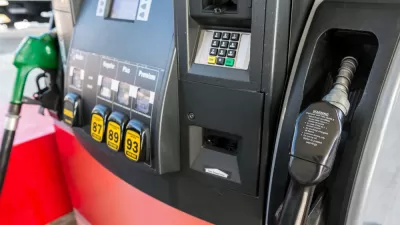The five-year transportation reauthorization known as the FAST Act relies on $70 billion of one-time, non-user fees to fund the $302 billion bill. The act also allows the government to fund the development of sustainable funding options by states.
Rep. Peter DeFazio (D-Ore.), ranking member of the House Committee on Transportation & Infrastructure, and Del. Eleanor Holmes Norton (D-D.C.), ranking member of the Subcommittee on Highways and Transit, "said in a letter to Transportation Secretary Anthony Foxx that states should begin experimenting with new infrastructure funding mechanisms now, despite the fact that Congress just passed a five-year, $305 billion highway bill last year," writes Keith Laing for The Hill.
"While the bill [PDF] was fully paid for, it did not resolve long-term solvency challenges of the Highway Trust Fund (HTF)," notes Norton's press release. "To help address this problem, the FAST Act establishes the Surface Transportation System Funding Alternatives program, which provides up to $95 million to enable States to test and demonstrate innovative methods to fund needed infrastructure improvements.”
An analysis [PDF] of the FAST Act [see page 14] by the Washington, D.C.-based American Road & Transportation Builders Association lists the program under Transportation Funding Alternatives:
The bill directs the Secretary to make grants to states to demonstrate alternative user-based revenue mechanisms that could maintain the long-term solvency of the HTF. The goal is to test at least two alternative user-based revenue mechanisms and to provide recommendations for adoption and implementation at the federal level.
Funding will be up to $15 million in FY 2016 and $20 million per year thereafter, and the federal share will be 50 percent
"DeFazio and Holmes Norton said Thursday that states should get to work now on finding a replacement for the beleaguered gas tax," writes Laing.
"We believe states are the laboratories of democracy, and the FAST Act provides the necessary funding to incentivize States to explore novel user fee structures that provide sustainable transportation funding."
Hat tip to Mayer Horn via University of Minnesota Congestion Pricing Listserv.
FULL STORY: House Dems want states to test gas tax alternatives

Alabama: Trump Terminates Settlements for Black Communities Harmed By Raw Sewage
Trump deemed the landmark civil rights agreement “illegal DEI and environmental justice policy.”

Study: Maui’s Plan to Convert Vacation Rentals to Long-Term Housing Could Cause Nearly $1 Billion Economic Loss
The plan would reduce visitor accommodation by 25% resulting in 1,900 jobs lost.

Planetizen Federal Action Tracker
A weekly monitor of how Trump’s orders and actions are impacting planners and planning in America.

Wind Energy on the Rise Despite Federal Policy Reversal
The Trump administration is revoking federal support for renewable energy, but demand for new projects continues unabated.

Passengers Flock to Caltrain After Electrification
The new electric trains are running faster and more reliably, leading to strong ridership growth on the Bay Area rail system.

Texas Churches Rally Behind ‘Yes in God’s Back Yard’ Legislation
Religious leaders want the state to reduce zoning regulations to streamline leasing church-owned land to housing developers.
Urban Design for Planners 1: Software Tools
This six-course series explores essential urban design concepts using open source software and equips planners with the tools they need to participate fully in the urban design process.
Planning for Universal Design
Learn the tools for implementing Universal Design in planning regulations.
Caltrans
Smith Gee Studio
Institute for Housing and Urban Development Studies (IHS)
City of Grandview
Harvard GSD Executive Education
Toledo-Lucas County Plan Commissions
Salt Lake City
NYU Wagner Graduate School of Public Service




























